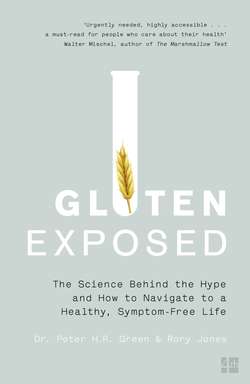Читать книгу Gluten Exposed: The Science Behind the Hype and How to Navigate to a Healthy, Symptom-free Life - Rory Jones, Dr. Green Peter - Страница 36
Use Breath Tests to Further Narrow the Diagnosis
ОглавлениеBreath tests are used to diagnose a number of conditions that produce GI symptoms, including fructose and lactose intolerance, bacterial overgrowth, and intestinal transit time. It is important to exclude these conditions in patients with irritable bowel syndrome (IBS) and celiac disease with persistent symptoms.
The sugars and carbohydrates we eat are normally digested and absorbed in the small intestine. But when they are mal-absorbed, they get into the colon, where they are fermented by the bacteria that live there. The bacteria dine happily on them, producing gas, water, and the painful symptoms known to those suffering from IBS. This also produces the hydrogen and/or methane gas that are a normal by-product of carbohydrate digestion. These gases are absorbed into the bloodstream and eliminated through the lungs in the breath.
Patients drink different sugars (sucrose, glucose, lactulose, fructose), and their breath is measured every half hour with special analyzers in order to measure the “peaks” of hydrogen and to determine if and how rapidly you are absorbing or mal-absorbing sugars. If lactose and fructose are digested and absorbed in the small intestine, you normally will not produce excess hydrogen.
Therefore, an increase in hydrogen indicates specific intestinal problems. With rapid transit, hydrogen is produced soon after the sugar is ingested; with bacterial overgrowth, hydrogen levels peak twice—once when digested by bacteria not normally found in the small intestine and later by the bacteria in the colon.
Breath tests are a simple and safe method of measuring alterations in digestion that create symptoms, but they have limitations. Some people have colon bacteria that produce methane gas instead of hydrogen, while others produce both. Patterns of release vary from patient to patient—some people have slower but normal transit time. Other conditions may produce malabsorption of carbohydrates, such as pancreatic insufficiency and celiac disease.
Breath tests can be particularly helpful for people with IBS told to go on the FODMAP diet. They can help to eliminate specific problem carbohydrates prior to starting a very restrictive diet. If you can isolate the main carbohydrate problem you can eliminate many weeks of trial and error. The tests should be part of a gastroenterologist’s armamentarium but are often not widely available or utilized.
